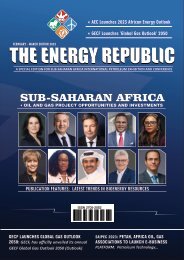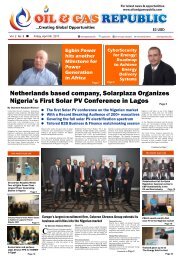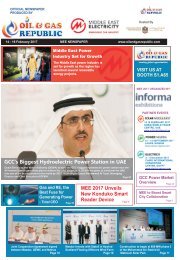The Energy Republic July Edition 2022
This magazine is a Special Edition focused on the NOG Conference and Exhibition 2022. The Nigeria oil and gas industry is undergoing a transformation following the recent policy enactment such as the Petroleum Industry Act (PIA) and ‘Decade of Gas Initiatives’ led by the Federal Government of Nigeria. This years’ NOG Conference features world-class conference programmes, including panel sessions to enable industry stakeholders, players and government discuss strategies in funding Nigerian energy mix going forward. In this edition, we featured an exclusive interview with H.E Chief Timipre Slyva, Honourable Minister of State for Petroleum Resources, including stakeholders and experts commentaries which are aligned based on the global trends in the energy, oil and gas industry. For general inquiries, please email us at: info@theenergyrepublic.com
This magazine is a Special Edition focused on the NOG Conference and Exhibition 2022. The Nigeria oil and gas industry is undergoing a transformation following the recent policy enactment such as the Petroleum Industry Act (PIA) and ‘Decade of Gas Initiatives’ led by the Federal Government of Nigeria. This years’ NOG Conference features world-class conference programmes, including panel sessions to enable industry stakeholders, players and government discuss strategies in funding Nigerian energy mix going forward.
In this edition, we featured an exclusive interview with H.E Chief Timipre Slyva, Honourable Minister of State for Petroleum Resources, including stakeholders and experts commentaries which are aligned based on the global trends in the energy, oil and gas industry.
For general inquiries, please email us at: info@theenergyrepublic.com
Create successful ePaper yourself
Turn your PDF publications into a flip-book with our unique Google optimized e-Paper software.
and sustainability. Our Commission
Chief Executive (CCE), Engr Gbenga
Komolafe, who spoke at the Africa
Economic Summit on 30th March 2022,
said that the Commission will be
adopting a 'phase-down' as against a
'phase-out' approach in exploitation
and utilizing Nigeria's endowed energy
resources. Nigeria's fossil fuels will still
be needed in the long term to meet the
growing domestic energy demand
especially as energy poverty continues
to be a major challenge in the country.
The Nigerian Government has adopted
gas as its transition fuel and is working
towards gas reserves growth,
optimizing gas production, increasing
gas utilization as well as eliminating gas
flaring. Gas is the cleanest fossil fuel
and will be pivotal in achieving a lowcarbon
economy. The Commission is
fully aligned with increasing natural gas
production to accelerate economic
development by serving as an
alternative to more carbon-intensive
fuels. The Petroleum Industry Act
which was passed in 2021 will serve as a
springboard for more investments in
gas exploration, development, and
utilization. The Act makes Nigeria more
competitive by providing improved
fiscal incentives that will ensure a fair
return on investment for investors.
Maximizing the utilization of our gas
resources will ensure we meet our
energy demands, diversify the
economy and achieve climate change
ambitions.
TER: What are your perspectives on
the Nigerian Decade of Gas?
Michael: The Nigerian Government
declared 2020 as the "Year of Gas" and
the next decade as the "Decade of Gas".
This was a deliberate move to put
natural gas on the front burner as
natural gas is the fuel of choice and will
become the dominant fuel in the
energy mix by 2050. The Decade of Gas
declaration was greeted with a lot of
optimism by stakeholders because
natural gas is pivotal to diversifying the
economy away from oil and will create
j o b o p p o r t u n i t i e s , i n c r e a s e
government revenue, and ensure
sustainable economic growth. The
N i g e r i a n G o v e r n m e n t h a s
implemented several gas investment
initiatives aimed at stimulating gas
production and utilization in the
country. The Nigerian Gas Flare
Commercialization Program (NGFCP) is
Michael Benedict Edem, Mechanical Engineer, Nigeri
an Upstream Petroleum Regulatory Commission
designed to eliminate gas flaring through
technically and commercially sustainable
gas utilization projects developed by
competent third-party investors who were
invited to participate in a competitive and
transparent bid process. The program has
the potential to create 300,000 jobs,
produce 600,000 MT of LPG per year, and
generate 2.5 GW of power from new and
existing IPPs, as approximately 700mmscf/d
is flared at 178 flare sites in Nigeria.
The National Gas Expansion Program
(NGEP) was launched in 2020 to reinforce
and expand gas supply as well as stimulate
demand in Nigeria through effective and
efficient mobilization and utilization of all
ava i l a b l e a s s e t s , re s o u rc e s , a n d
infrastructure in the country. NGEP has the
capacity to reduce poverty by making gasbased
fuel available, affordable, and
accessible to mostly under-served
communities in the country, thus
contributing to job creation and human
capital development through new
investments in the gas sub-sector.
To drive the implementation of NGEP, the
Central Bank of Nigeria has provided a ₦250
billion intervention facility to qualified
companies to establish mid-stream and
downstream gas facilities that will utilize
gas. The Nigerian Gas Transportation
Network Code (NGTNC) was launched in
2020 to establish a legal and contractual
framework between transportation
network operators and gas shippers, that
provides a set of rules for efficient
operation, open access, availability,
reliability, and use of the gas pipeline
system. The code will promote investments
in the gas sector, entrench specialization
and professionalism in the gas business,
eliminate gas flaring, stimulate domestic
gas utilization in Nigeria, and boost revenue
generation for the country.
NUPRC INTERVIEW
The Ajaokuta-Kaduna-Kano (AKK) gas
pipeline which is undergoing construction
is a 2Bscf/day, 48'' and 614km gas pipeline
connecting Lokoja, Abuja, Kaduna, Kano,
Zaira, and Katsina states. AKK will boost
economic activities in Northern Nigeria by
providing access to gas. The Obiafu-
Obrikom-Oben (OB3) is a 2Bscfd, 48'' and
127km gas pipeline that links the eastern
and western regions of the country and is
undergoing construction.
Export gas pipelines such as the Nigeria
Morocco gas pipeline and Trans-Saharan
gas pipeline are critical gas infrastructure
that when completed will make Nigeria a
major gas supplier to Europe and West
Africa.
The Petroleum Industry Act which was
passed in 2021 will provide a competitive
investment climate for gas with several
fiscal incentives that will attract cashflows
into the country.
Some of the incentives in the PIA are the
establishment of a Midstream and
Downstream Gas Infrastructure Fund,
reduced royalty rates for gas production,
the establishment of cost-reflective pricing
for natural gas to the domestic market,
exemption of hydrocarbon tax on gas
production excluding production of crude
oil, liquid NGLs and field condensates
derived from associated gas upstream of
the measurement point, application of
section 39 of the Company Income Tax Act
and extension of renewal of tax-free status
for pipeline investors by 5 years.
These initiatives underscore Nigeria's
readiness to transform the economy into a
gas economy in the decade of gas and
beyond.
TER: Recently, Nigeria, Niger, and Algeria
have signed an agreement that will see
development resume on the $13 billion
Trans-Saharan gas pipeline project, an
opportunity to diversify the European
Union's gas supply in Africa. What's your
assessment on the potential of this
project?
Michael: The Trans-Saharan gas pipeline
(TSGP) was conceived in the Nigerian Gas
Master Plan as a critical enabler for an
increased supply of natural gas to West
Africa and Europe. The pipeline will connect
the Ajaokuta-Kaduna-Kano (AKK) gas
pipeline once completed, via Niger, to the In
Salah development area gas pipeline in
Algeria and ultimately to Europe.
47
THE ENERGY REPUBLIC I SPECIAL EDITION















